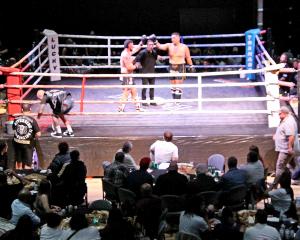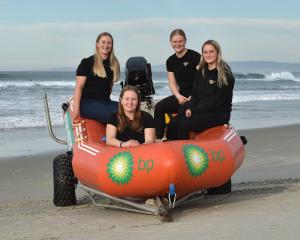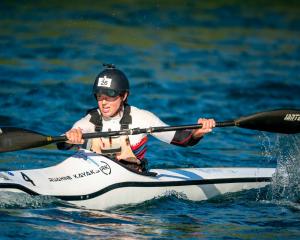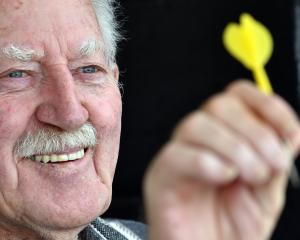The Black Caps are flying high, the All Blacks are top of the tree. Our rowers are nearly unbeatable. That would suggest we are a great sporting nation. But down below at grass roots level it is not all rosy. Playing numbers in some sports are plummeting. Sports reporter Steve Hepburn looks at what people are doing on the sports field, or more accurately what they are not doing.
It has been a great summer so far.
Cloudless skies. Long hot days.
Plenty of time to get outside and roll the arm over.
But it would appear not many are doing that.
How many cricket games did you see on the street or the local park over the past few weeks?Chances are, not many.
Participation rates, in summer sports in particular, are on the decline.
Cricket, softball, tennis - the organised version anyway - appear to be going the way of the dodo and Classic Coke.
Whatever the reason, and there are plenty, people seem to not want to commit to playing a sport, team sport especially, anymore.
Cricketers, tennis players, softballers, golfers - the numbers actually playing the game are all down by more than half over the past 25 years.
Winter sports are also feeling the pinch - most of them are on the slide - although football appears to be holding steady, if not on the rise, and rugby has not dropped off by much.
So what is causing the drift from organised summer sport?Green Island Cricket Club president John Moyle has been at the club for more than 25 years.
In his first season, he went to the club's annual meeting and there were 45 people there and elections were held for office holders.
These days, the club annual meeting takes place in Moyle's front room and he has to ring people to get them to attend.
''You look at our top junior side last season. They finished runner-up or near the top of the table. They have all gone to different high schools and a few of their schools do not offer cricket,'' Moyle said.
''So you've lost those guys already. So from 11 or so players, you might only get three back.''
Moyle said just 10 cricketers came out of Dunedin high schools at the end of last season in Dunedin to play club cricket, which was not many.
''Those five years at high school are a big black hole. That is not having a go at the teachers but that is just the way it is now.
''Everyone is so much more accountable now. Got so much more to do. We have become auditors of everything.
''If you are a teacher, would you work for nothing on your rare day off? I wouldn't. No-one would. Teachers have to tick so many more boxes these days.
''Years ago, most people just worked five days a week, maybe a Saturday morning, but nowadays who does that?
''With sport and most teams, kids especially, they need a good coach. They need someone to lead them. But so many people haven't got time to do it.''
Moyle, who runs a supermarket in Green Island, said perhaps it was time to look at closing shops on Sundays and making that the time for dedicated sport.
''The thing about Sunday shopping, no-one is really buying anything. If we closed them, people would just go and do something else.''
But if people are not playing cricket and other summer sports, are they just simply playing other sports?
Maybe not.
Touch has a few numbers but not what it was. Mountain-biking attracts some as does triathlon but nothing on the scale of the numbers of players who have left team sports.
And is playing for half an hour one night a week, after no practice, all dressed in mufti, against a team with a name like ''the untouchables'' really sport? Pastimes have all of a sudden become legitimate sports.
Moyle says sport in those teenage and young adult years is important for the rest of your life.
''I got involved with a junior colts rugby team at Green Island last season. I used to say to them `these are the best years of your life. You get with your team, have some real fun, talk a bit of rubbish'.
''And they were a good bunch and had some good times. But I wonder how many younger ones realise what they are missing.''
Softball as a sport has taken a pounding. It is struggling to get four teams for its senior grade. Long-time club Ellis Park was forced to drop out of the senior grade this year. It has no profile in the national media.
Otago Softball Association operations manager Jill Johnson said lifestyle changes have had a big impact.
''People used to play three or four sports a year but no-one does that anymore. There is so much more to do, so many more sports to play,'' Johnson said.
''People do not really seek any commitment these days. They do not want to be involved.''
She said many sports were offering up leagues for people where the players simply paid money and everything else - facilities, opponent, scoring - was arranged for them.
''But that is not that easy to do in team sports.''
Dennis Radford has reported, coached and played tennis for more than 30 years. He is a life member of Tennis Otago.
He said a lack of structure for the sport in New Zealand was hurting it.
''Players come through and they get to 17, 18 and there is nothing there for them. You have to have a lot of money to go further.
''I have got a list of 70 top players who have all quit. You'll not find any of them in their 20s playing in Dunedin anymore. It's a real shame.
''There is nothing to aspire to. They used to be a lot of tiers to play through. I played in 200 ties for Otago. Now, you'd have to play for 50 years to do that.''
Saturday competitions were fading, he said, but midweek contests, where it was easier to commit to and freed up the weekend, were popular.
''People get bored easily, I suppose, and tennis can be a game which could go from 45 minutes to three hours. People don't want to be stuck at a tennis tournament for a couple of days.''
He said tennis equipment sales were not markedly dropping, so people were still playing the game - just not on a Saturday.
''One student said to me she didn't want to play any more because Saturday was drinking day. I couldn't believe that. And many of them have to work. They have all got student loans to pay.''
The national game is not immune from the fading of playing the game.
The number of teams playing rugby has dropped slowly over the past 25 years. School teams now have to travel all over Otago and Southland to get meaningful games.
Zingari-Richmond chairman Murray Collie said it used to be cricket or softball in summer and rugby or football in the winter.
''There are so many more sports to play. To have someone playing senior cricket and senior rugby is rare. I don't know if it still happens.''
Collie wondered if starting seasons so early helped.
''A guy might say to the coach they don't want to start so early. So the coach doubts his commitment and he ends up not playing.
''We used to start at Easter. Now we'll be three or four games in when Easter comes around.''
Players do seem to pick up injuries more and it was not getting any easier with the hard grounds and bigger players, he said.
Many clubs relied on local schools to supply players.
But some schools were not as active in sport as they used to be. People dropped out at that level and simply never returned.
So what to do? How to boost the numbers?Football has stayed relatively static.
Football South game development manager Tracy Fleet said football in general had increased around the country.
''I think people like that football on the whole is well organised and has that club culture which a lot of people like. They feel part of something,'' she said.
Youngsters playing games at the one place in Dunedin - the Oval - helped.
She said the Whole of Football plan set up by New Zealand Football improved skills and was popular with players and coaches. Other sports were trying to copy it.
The sport also had masters grades, which were popular for those who still wanted to play but only at a level where they felt comfortable.
But masters is for those who have already been. It is not the future.
One must wonder why there are big parks like the Oval and Logan Park in the city when playing numbers have dropped so much?How much is it costing the city to maintain fields which are barely used?Collie remembers what it was like 20-odd years ago.
''You'd go down to Logan Park in the middle of summer and there'd be people and kids everywhere. Right back to behind the University Oval. You never see anything like that now.''












